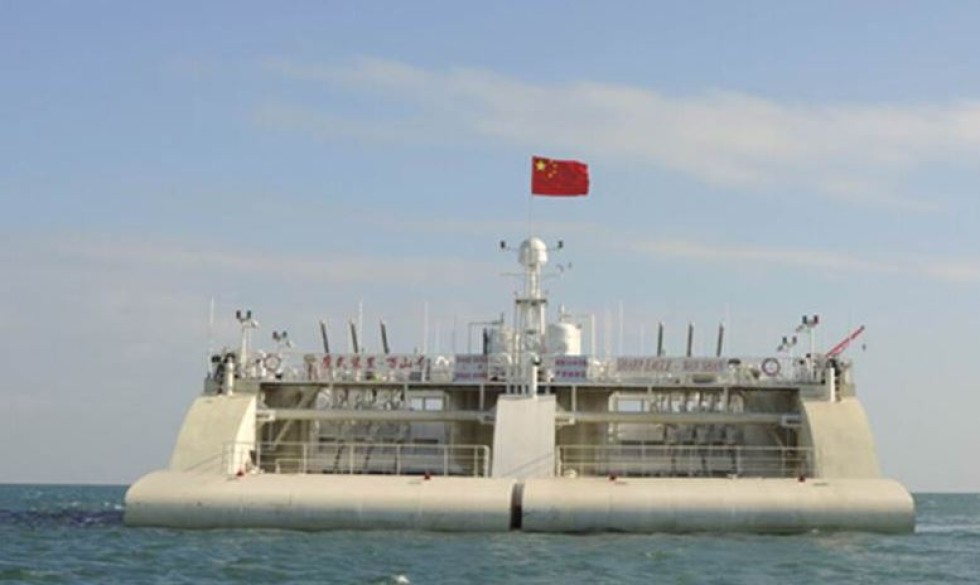Harnessing the ocean: China’s military looks to wave farms to power radar on remote islands as South China Sea disputes simmer
I was wondering how are they going to power the radar and other power hungry military installation I guess we have the answer now wow a cutting edge technology
Country has been testing one of the largest power-generating machines of its kind in the world with maximum capacity in excess of 200 kilowatts.
China plans to build electricity-generating wave farms near remote islands in the South China Sea, where it is engaged in territorial disputes with several of its neighbours, to mitigate the threat of a power blackout hitting its military radars there, according to researchers involved in the project.
These giant floating power stations are expected to significantly strengthen the nation’s foothold in the disputed waters.
A full-scale unit, about half the size of a soccer field, was deployed for a test run in waters off the Wanshan archipelago near the city of Zhuhai in Guangdong province earlier this month, said the researchers at the Chinese Academy of Sciences’ Guangzhou Institute of energy Conversion.
Using cutting-edge mechanical designs, the generator will efficiently transform the constant movement of the sea water into electricity and stay in operation on windless days and also in the face of a super-typhoon, they said.
China’s breakneck rush to build civilian and military facilities in these seas has stretched its power supply chain in recent years. One of the biggest headaches has proven to be keeping the country’s larger-than-ever radar network in constant operation.
“Military radars are power-hungry beasts that must be fed all the time,” said one researcher, who declined to be named due to the sensitivity of the issue.
Sending fossil fuels to remote islands is costly and time-consuming. The shipping can also be affected easily by bad weather or unfriendly neighbours,” the researcher added.
More power is needed for the radar to cast its net wider. When operating at full power to get a bead on a distant fighter jet or unknown object, an early warning system may require thousands of kilowatts of energy - tantamount to the total demand of 1,000 average households in the United States.
Conventional renewable energy sources are not suitable for small islands, the researchers said.
Most lack sufficient land area for the installation of solar power panels, which at any rate are usually quickly compromised by faecal matter from birds, the team said.
Moreover, wind turbines cannot generate a stable enough energy supply, and their performance is also severely affected by the weather.
The unit that was tested is among the largest power-generating machines of its kind in the world, capable of churning out in excess of 200 kilowatts.
Similar power buoys deployed in the US and Australia have shown peak power outputs of around 150kw. The largest single wave energy convertor to date was a prototype deployed at a wave farm in Portugal, which recorded 750kw.
But the new Chinese generator can survive even the most extreme weather conditions, the researchers said.
In the event of a typhoon, it would automatically partially submerge, leaving only a small area on the surface to avoid damage caused by strong winds.
The unit is not anchored to the ocean bed, which allows it to move freely amid strong waves.
The design, which resembles half a submarine, has performed well. A smaller 10-kw prototype even survived Typhoon Haiyan in the South China Sea two years ago. The typhoon claimed over 6,000 lives in the Philippines.
The machine continued generating power during the typhoon even after most of it was submerged, the researchers said.
The wave farms that are planned have a flexible capacity with room to
grow as more converters can be added later to meet demand.
The electricity will be channelled to nearby islands using underwater cables.
The enormous power requirements of military radar facilities means they cannot operate on a full-time basis with a large and stable energy supply, so using sea waves to provide power is a logical solution, said Li Ming. The professor of radar technology works at the National Lab of Radar Signal Processing in Xidian University, Xi’an in northwestern Shaanxi province.
But Li doubted whether a wave farm would fully satisfy demand.
“A warning radar consumes far more than 200kw of power,” he said.
Another problem is the cost of such an operation. A wave farm needs many power-generating units to form a grid for maximum output.
But those who field-tested the single unit recently said it cost nearly 20

